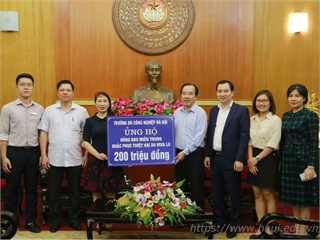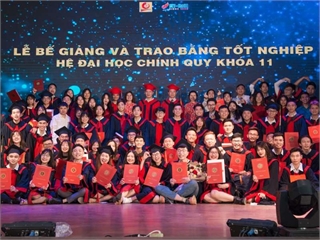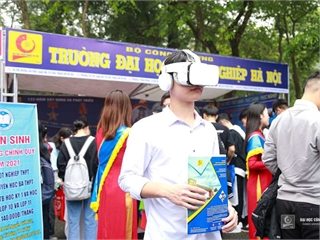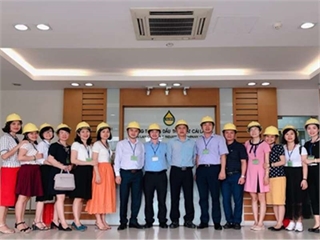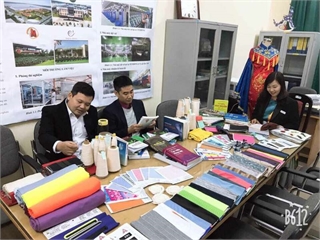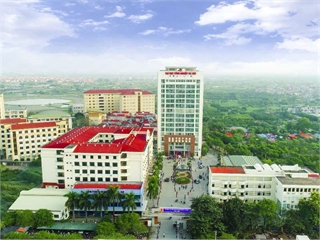Business associate internships help improve the practical competence and soft skills of students
1. Overview
Education and training associated with professional practice is an indispensable requirement for universities, especially in the context of the development of a knowledge-based economy and international integration. To do this well, universities need to establish close relationships with businesses. Universities and businesses participate in the training process. Therefore, internships and practical experiences at enterprises are mandatory requirements for students. According to Hager and Gonczi (1996), higher education institutions need to build an optimal training program to help students not only grasp the theory deeply and thoroughly but also have the practical ability and soft skills to be able to fully meet the requirements of the labor market. In which:
The theory is the conclusion from practice, which is formed and gradually enters the system when people perceive the objective world. Over time, these theories become rules and are applied backward to explain practice (Eraut, 2000).
Unlike theoretical knowledge, practical competence is often summarized and described in the form of processes, such as planning process, implementation process, control process, decision-making process, practical activities (Kieran Setiya, 2009). Practical competence requires students to be able to judge, consider... (Bereiter et al., 1993).
Soft skills are also known as practical social skills, related to the use of language, demonstrating the ability to integrate into, live with or interact with society, community, group or organization. Soft skills usually include communication skills, teamwork skills, creativity and innovation skills, etc. (Francis Green, 2011).
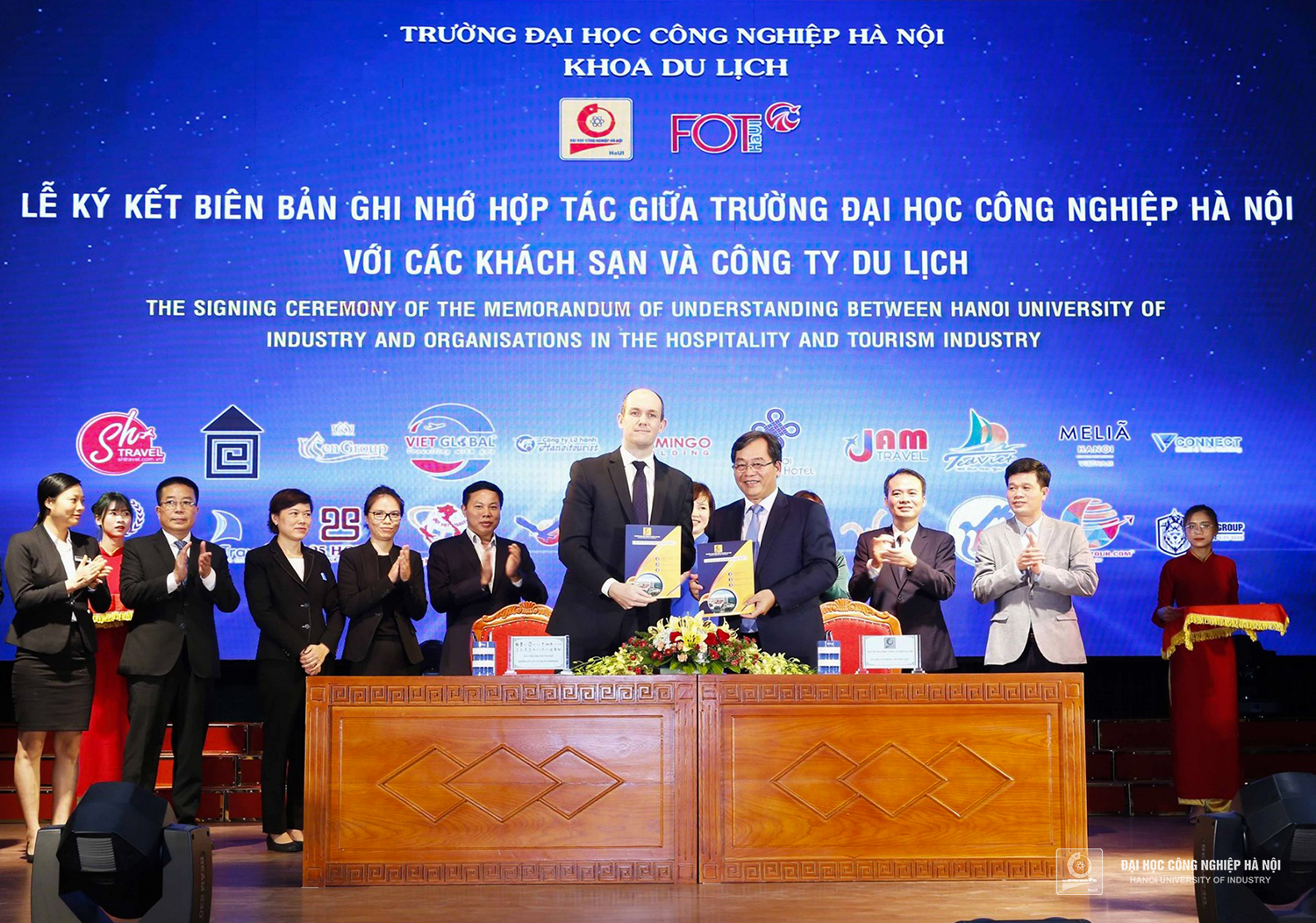 The signing ceremony of the memorandum of understanding between Hanoi University of Industry and organization on the hospitality and tourism industry in 2020
The signing ceremony of the memorandum of understanding between Hanoi University of Industry and organization on the hospitality and tourism industry in 2020
Internships associated with businesses are learning activities that help students connect theory and practice, improve practical competence and soft skills because both universities and businesses have responsibilities and benefits:
Universities | Businesses |
Desire Improving practical competence and soft skills for students so that they can meet the needs of businesses | Ability Providing internship placement for students Providing practical guide, practical experience for students |
Ability Developing training programs and conducting training activities according to the program | Desire Recruiting qualified human resources to meet the job requirements |
2. Internships and practice activities associated with businesses to improve practical competence and soft skills of students at Hanoi University of Industry
2.1. Internships and practice activities associated with businesses
As an application-oriented training institution, Hanoi University of Industry is always interested in internships and practice activities at businesses to ensure students have enough time to apply theory in practice, be trained and develop skills in a practical environment. Therefore, the amount of time spent on activities such as internships, practice sessions, and field trips at enterprises accounts for about 30-40% of the total duration of the training program (table 1).
Table 1. Duration of activities associated with businesses in the training program of all sectors
No. | Activities associated with businesses | Proportion in training program (%) |
1 | Practice activities at enterprises | 11 ÷ 15 |
2 | Internships at enterprises | 20 ÷ 30 |
3 | Average | 30 ÷ 40 |
(Source: compiled according to the training programs of all majors)
In the training process, a student has at least 3 times of practical experience at enterprises. On average, about 20,000 - 25,000 students have practical experiences at 5,200 - 5,450 enterprises each year (Table 2).
Table 2. Number of students doing internships and practical experiences
Content | The academic year 2017 - 2018 | The academic year 2018 - 2019 |
Number of enterprises accepting students to do internships and practical experiences (turns) | 5,200 | 5,450 |
Number of students doing internships and practical experiences at enterprises (turns) | 20,415 | 24,780 |
(Source: Compiled according to the survey report of the Center for Business Cooperation)
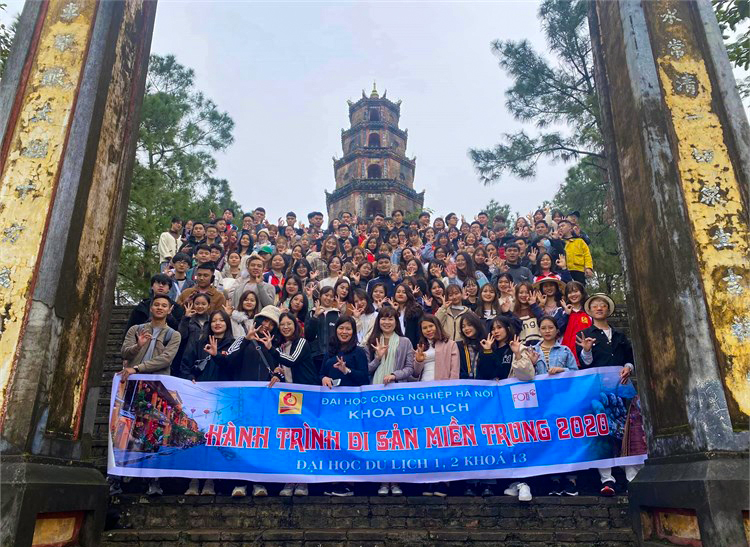
Students of the 13th Course of the Faculty of Tourism attended the Central Viet Nam Heritage Tour
Many efforts of the University, faculties and lecturers in deploying collaboration activities with businesses to organize internships and practical activities to help learners learn and experience the real world at enterprises are presented through the degree of cooperation (Table 3). The degree of cooperation is assessed on a 5-point scale (with 1 point being very weak cooperation and 5 points being very close cooperation).
Table 3. The degree of cooperation between enterprises, the University, faculties and lecturers in the process of supporting students to intern and practice at enterprises.
No. | Industry sector | Evaluation of the degree of cooperation | Note |
1 | Engineering | 4.29 | |
2 | Social Economics | 4.27 | |
3 | Overall average | 4.28 |
(Source: Calculation based on survey results in 2020)
The result of the survey on the degree of cooperation on a 5-point scale for the engineering sector is 4.29 and that of the socio-economic sector is 4.26 and that of the whole university is 4.28, which shows that a high degree of cooperation between the University and enterprises.
2.2. Results of internships associated with businesses to improve students' practical competence and soft skills
During the internship and practice process of students, enterprises will participate in the process of assessment, fostering and further training for students in terms of practical knowledge, practical competence and soft skills. The level of assessment on a 5-point scale (with 1 point being very weak and 5 points being very good) is shown in Table 4.
Table 4. Enterprise evaluation of practical competence and soft skills of students at Hanoi University of Industry.
No. | Content | Degree evaluation |
1 | Practical competence | 3.70 |
2 | Soft skills | 3.74 |
(Source: Calculation based on survey results in 2020)
The assessment results of enterprises show that improving practical competence of students of Hanoi University of Industry reaches 3.70 and that of soft skills formed through the process of practice is 3.74.
Survey results of 2,091 students show that 97.4% of students believe that activities associated with businesses help them improve their practical competence and soft skills. Based on data analysis, the results are specified in Table 5.
Table 5. Activities associated with businesses help students improve the practical competence and soft skills of students at Hanoi University of Industry.
Content | Average value (on a 5-point scale) | ||
Engineering (1,566 responses) | Social economics (525 responses) | Hanoi University of Industry (2,091 responses) | |
1. Improving practical competence | 4.26 | 4.25 | 4.26 |
2. Developing soft skills | 4.15 | 4.29 | 4.18 |
(Source: Calculation based on survey results in 2020)
Students highly appreciate practical activities that help them develop necessary soft skills (communication, teamwork…) with the rating level of 4.18 and that of improving practical competence is 4.26. The results of students' self-assessment are also quite similar to those of enterprises, but the perspective of enterprises as employers is more rigorous (Table 4).
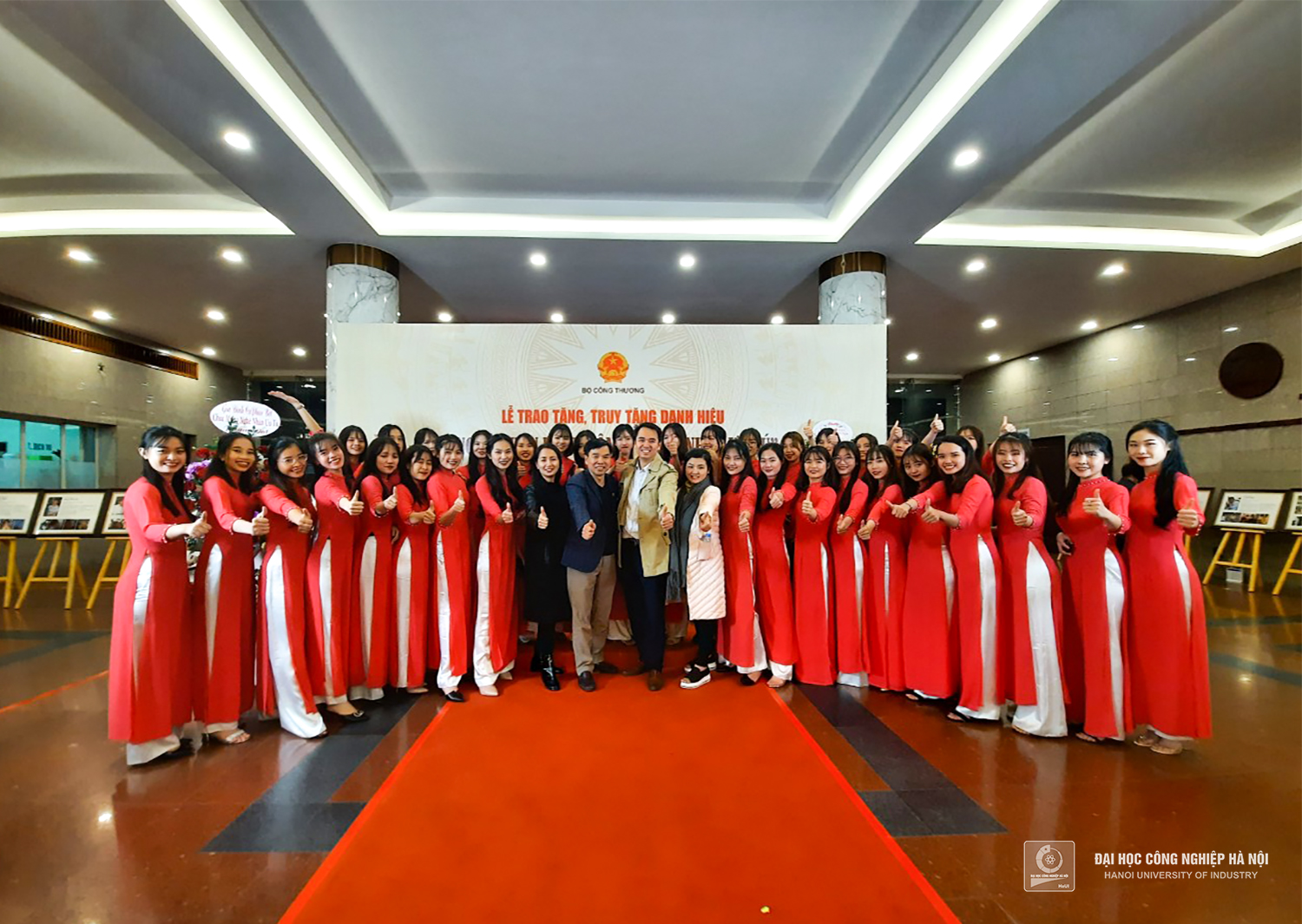 Students of the Faculty of Tourism improve practical competence and soft skills through internship activities
Students of the Faculty of Tourism improve practical competence and soft skills through internship activities
2.3. Evaluating advantages, limitations and causes
2.3.1. Advantages
- The policy and orientation to strengthen the connection between the University, faculties and enterprises in order to improve training quality is absolutely correct.
- The training program is designed with 30-40% of practice time and internships at enterprises help students apply theory to practice as well as accumulate professional experience during their study at the university. Since then, after graduation, students have quickly met the needs of employers.
- The quality of the internship is always guaranteed as committed in the training program. This result comes from the fact that the internship content is clearly specified, the University’s lecturers and the instructors at enterprises are always dedicated to students during the internship, and the students are active and diligent, always comply with the regulations of the University as well as the regulations of the business.
- Internship positions at enterprises are very diverse, meeting the output standards of the training program because the University and faculties have had agreements with businesses about internship and practice programs for students.
2.3.2. Limited and causes
- Cooperation between the University, faculties, lecturers and enterprises is closely evaluated. However, it is necessary to standardize the set of criteria to evaluate the level of cooperation, complete the cooperation mechanism to ensure the enhancement of the rights and responsibilities of enterprises in cooperation activities.
- There has not been a general consensus in developing a set of criteria to evaluate the performance level of the instructors.
- The plan for internship and practical experiences is not flexible.
- There are still some students who are not active because they do not understand the objective and meaning of the corporate intern programs.
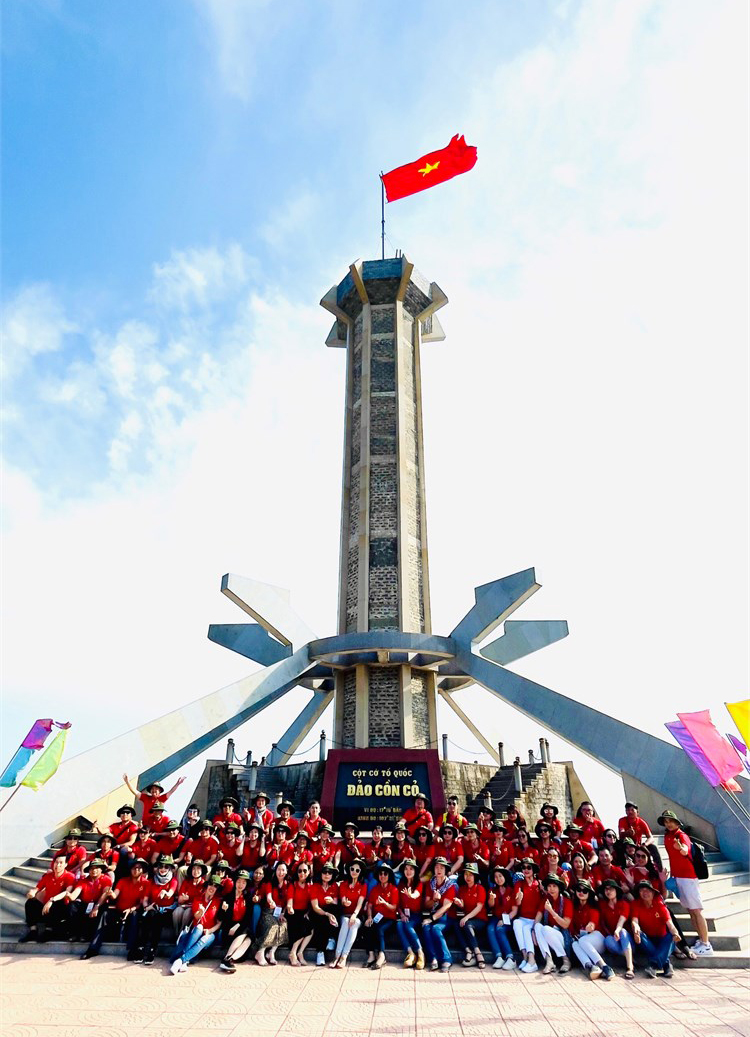
Students of the Faculty of Tourism participated in FAM TRIP program
3. Conclusions and recommendations
Is there a better way for students to learn than having to experience it? Wren et al. (2002) gave the answer that students can be learned through learning activities that closely combine theoretical research and practical experiences through forms of internship and practical experience at enterprises. As a result of experimental research at Hanoi University of Industry, it can be seen that internships and practical experiences at enterprises have really helped students improve their professional competence and forge skills in order to meet the increasingly strict requirements of the current labor market.
To promote the effectiveness of internships and practical experiences at enterprises, specific solutions are needed:
(i) For the University
- It is necessary to develop a set of criteria to evaluate the level of business cooperation in order to select suitable enterprises for each training sector and each training faculty. On that basis, the University signs an agreement to strengthen the cooperation with businesses.
- There should be a clear mechanism, creating a consensus on the rights and responsibilities between the businesses and the University.
- Completing the system of documents guiding the assessment and grading of students for businesses, making it easier for businesses to evaluate interns accurately and effectively based on available criteria.
(ii) For faculties, professional subjects and lecturers
- Proactively and further strengthen the cooperation with reputable businesses, thereby providing students with information to register before each internship.
- Creating the connections and interactions between the faculty, professional subjects and instructors with businesses to understand the internship process of students.
- Each specialized faculty needs to develop a set of criteria to evaluate the performance level of the instructors and the results of the students' internships and practical experiences, thereby drawing experience, specifying the results to find a way to overcome difficulties for the next internship.
- Designing a timetable for internships and practical experiences that is flexible and suitable to the production and business characteristics of enterprises and the training sector; extending the duration of the internships and practical experiences at enterprises in each academic year in addition to current activities, helping students get acquainted and experience more with reality.
- Providing more detailed regulations on internship positions of students at businesses for each internship and enriching internship positions. For the internships and practical experiences at businesses of the social economics sector, it is necessary to pay more attention to professional competence development while for the engineering sector, focusing on soft skills for students is crucial.
- Instructors need to organize orientation sessions, give specific and detailed instructions before students do the internships, then regularly monitor the internships and practical experience process of students at enterprises.
- Continuing to propagate and educate students to properly perceive the role of each internship at the enterprise so that students have the right attitude when doing internships, make efforts to practice, and gain experience during the internships.
-
Saturday, 09:52 04/12/2021

